As was foretold, we've added advertisements to the forums! If you have questions, or if you encounter any bugs, please visit this thread: https://forums.penny-arcade.com/discussion/240191/forum-advertisement-faq-and-reports-thread/
Options
The [ECONOMY]
ronya Arrrrrf.the ivory tower's basementRegistered User regular
Arrrrrf.the ivory tower's basementRegistered User regular
 Arrrrrf.the ivory tower's basementRegistered User regular
Arrrrrf.the ivory tower's basementRegistered User regular
The lack of exciting headline news has caused a lack of discussion here in D&D, but the world continues to turn. So here's an update on our drab, unexciting world of The Biggest Recession Since 1929!
US vital statistics:
US fiscal outlook:
US monetary policy:
The unimportant and insignificant:
World outlook:
(no, this isn't the economics thread I promised I would make. Haven't had the time, sadly...)
US vital statistics:
The good news is that US unemployment doesn't appear to be continuing to increase:
 (source)
(source)
The bad news, of course, is that unemployment remains very high and Congress has failed to extend unemployment benefits (as late as November last year the Senate managed to unanimously extend unemployment benefits. How things change).
In the meanwhile, prices have surprisingly fallen in recent months:
 (source)
(source)
e: output has recovered, though! thanks enc0re:
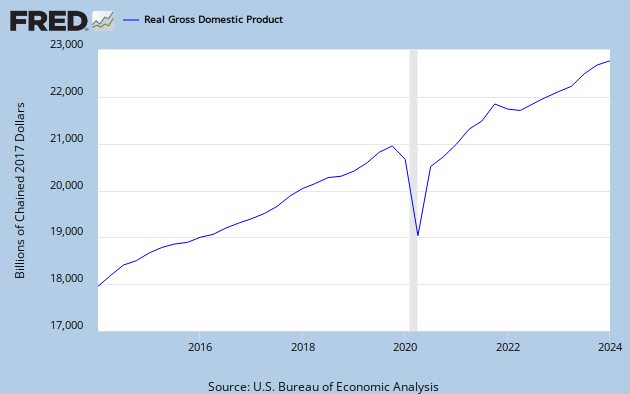

The bad news, of course, is that unemployment remains very high and Congress has failed to extend unemployment benefits (as late as November last year the Senate managed to unanimously extend unemployment benefits. How things change).
In the meanwhile, prices have surprisingly fallen in recent months:

e: output has recovered, though! thanks enc0re:

US fiscal outlook:
Net US government spending has steadily increased, albeit by not as much as you might think, given cuts in state and local spending (net spending is the blue line):
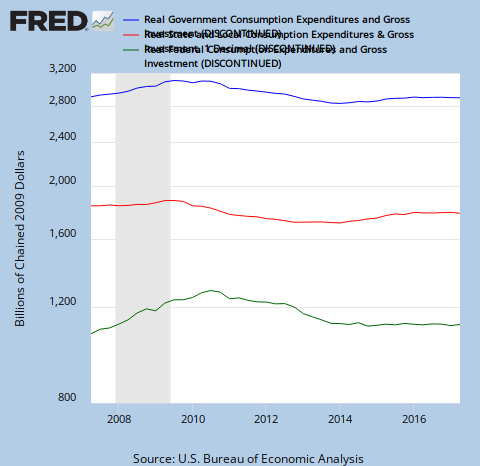
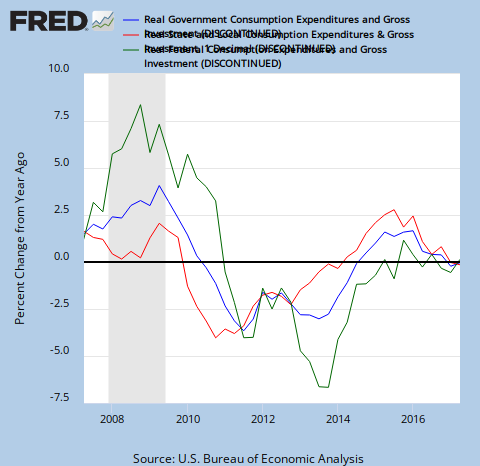
At this point it appears unlikely that Congress will pass further large spending increases; if anything there is pressure to engage in austerity, despite the Treasury remaining easily able to raise funds and low market expectations of inflation.


At this point it appears unlikely that Congress will pass further large spending increases; if anything there is pressure to engage in austerity, despite the Treasury remaining easily able to raise funds and low market expectations of inflation.
US monetary policy:
The US interest rate - the federal funds rate - has remained at 0-0.25% since December 17 2008. There are now mutterings that the Federal Reserve may engage in either more unconventional easing, in the name of fighting future deflation, or raising rates, in the name of fighting future inflation.
The Federal Reserve engaged in some unconventional quantitative easing in 2009 after hitting the zero bound; regrettably, it has been neutralized by banks choosing to dump said easing back into Federal Reserve coffers:
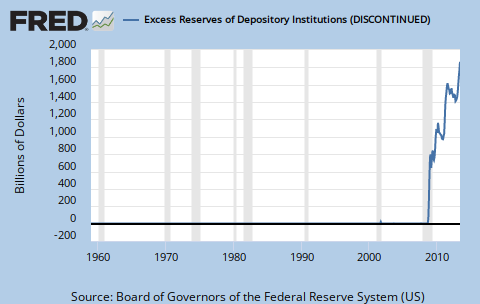
presumably because the Federal Reserve is paying interest on excess reserves. Why it has chosen to do this is, of course a mystery.
Of the Federal Reserve board of governors two of the traditional seven seats are empty and one more retiring; somewhat like the Supreme Court, the balance of votes is crucial since the board normally dominates the FOMC and thus essentially sets monetary policy. Obama delayed nominating three more until April this year, possibly due to the unexpectedly vicious fight over Bernanke's reappointment as Chairman.
The Federal Reserve engaged in some unconventional quantitative easing in 2009 after hitting the zero bound; regrettably, it has been neutralized by banks choosing to dump said easing back into Federal Reserve coffers:

presumably because the Federal Reserve is paying interest on excess reserves. Why it has chosen to do this is, of course a mystery.
Of the Federal Reserve board of governors two of the traditional seven seats are empty and one more retiring; somewhat like the Supreme Court, the balance of votes is crucial since the board normally dominates the FOMC and thus essentially sets monetary policy. Obama delayed nominating three more until April this year, possibly due to the unexpectedly vicious fight over Bernanke's reappointment as Chairman.
The unimportant and insignificant:
Many European countries entered the crisis with considerable budget deficits and, in the case of Greece, a spectacularly large hidden deficit that caused its credit rating to deteriorate dramatically upon discovery. With falling revenues due to recession, these countries have been forced to either risk default or engage in austerity.
Portugal, Ireland, Italy, Greece, and Spain started engaging in austerity first, to varying degrees of political success. Greece is undergoing the largest cuts and the most trouble. How successful austerity has been or will be seems to vary among pundits (it sucks! No, it works!).
Britain, Germany, and Latvia are also cutting their budgets; however, Germany and Britain are far richer than the other countries to begin with, so perhaps they will face less trouble! And for Latvia, well, "with memories of Soviet living standards still fresh, however, the public is resilient and Latvia is weathering a crisis on a scale that would have triggered mayhem in western Europe". So says The Guardian, anyway.
Thus far, France remains the only Western Europe major economy to avoid legislating cuts, although this may soon change. Embarrassingly, among the EU states only Luxembourg has remained able to remain within the EU limit of controlling the deficit at less than 3% of GDP. Of major European economies, Turkey has also done well, but it isn't in the EU (yet?).
The PRC abandoned the RMB peg against the US dollar last month; moving forward it will peg the RMB against a basket of currencies instead. In any case, domestically its ridiculously fast growth has meant that the global recession has caused it to only grow a little less fast. Maybe Beijing quietly thinks the whole mess is a good thing, given worries over inflation and overheating back in 2007. Who knows?
Russia has avoided facing a budget crisis due to a rapid recovery in oil prices from the 2008-2009 slump, but it still is facing high unemployment. Happily, unemployment appears to have dropped in May and June, so perhaps it is improving.
India has similarly managed to shrug off unemployment this year, and managed to duck a budget crisis by selling off vast amounts of government-owned assets. It's a good time to be a recently socialist state.
Portugal, Ireland, Italy, Greece, and Spain started engaging in austerity first, to varying degrees of political success. Greece is undergoing the largest cuts and the most trouble. How successful austerity has been or will be seems to vary among pundits (it sucks! No, it works!).
Britain, Germany, and Latvia are also cutting their budgets; however, Germany and Britain are far richer than the other countries to begin with, so perhaps they will face less trouble! And for Latvia, well, "with memories of Soviet living standards still fresh, however, the public is resilient and Latvia is weathering a crisis on a scale that would have triggered mayhem in western Europe". So says The Guardian, anyway.
Thus far, France remains the only Western Europe major economy to avoid legislating cuts, although this may soon change. Embarrassingly, among the EU states only Luxembourg has remained able to remain within the EU limit of controlling the deficit at less than 3% of GDP. Of major European economies, Turkey has also done well, but it isn't in the EU (yet?).
The PRC abandoned the RMB peg against the US dollar last month; moving forward it will peg the RMB against a basket of currencies instead. In any case, domestically its ridiculously fast growth has meant that the global recession has caused it to only grow a little less fast. Maybe Beijing quietly thinks the whole mess is a good thing, given worries over inflation and overheating back in 2007. Who knows?
Russia has avoided facing a budget crisis due to a rapid recovery in oil prices from the 2008-2009 slump, but it still is facing high unemployment. Happily, unemployment appears to have dropped in May and June, so perhaps it is improving.
India has similarly managed to shrug off unemployment this year, and managed to duck a budget crisis by selling off vast amounts of government-owned assets. It's a good time to be a recently socialist state.
World outlook:
Pretty good, growth-wise:
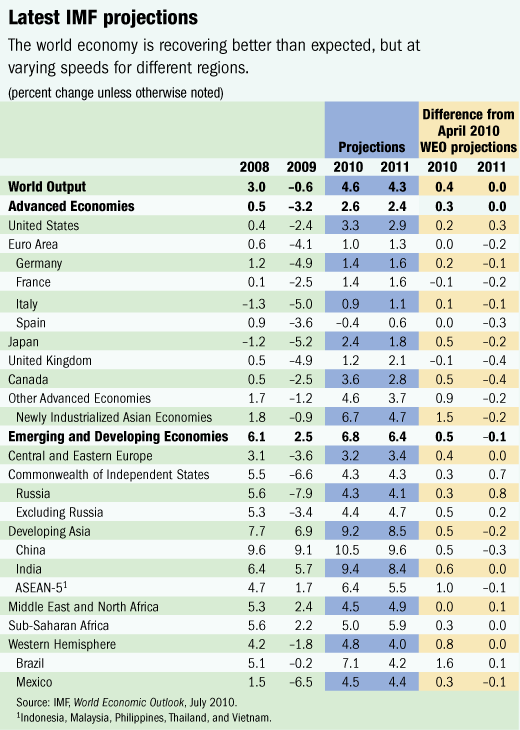
The problem among developed economies is the prospect of a jobless recovery - where growth recovers but jobs annoyingly don't. Developing economies appear to be chugging along well.

The problem among developed economies is the prospect of a jobless recovery - where growth recovers but jobs annoyingly don't. Developing economies appear to be chugging along well.
(no, this isn't the economics thread I promised I would make. Haven't had the time, sadly...)

ronya on
0
Posts
http://krugman.blogs.nytimes.com/2010/07/07/self-defeating-austerity/
Edit: And don't worry, ronya. This will inevitably devolve into an economics thread. Now that all the positive data is laid out there, the normative gnashing of teeth will begin.
A change of direction in Japan is... unexpected. I hadn't even noticed :P
Recession over! Boo ya!
deflationary spiral here we come?
Why is everyone defining debt as a percentage of GDP -right after a recession-? I can see doing that during normal times as a point of comparison, but the ratio is going to be artificially fucked right now. If your GDP dropped by, say, 10%, you'd also have to drop spending by 10%. Seems like a really bad idea.
How would you suggest we define it? People get map when you use the real number because its incomprehensibly big. The only way it makes any sense or is in anyway relevant is in comparison to an equally big, economically relevant number... GDP
I just dislike the aspect that calls for automatic cuts whenever things slow down, regardless of whether that's the best response or not.
Maybe I'm just one of those weird people, but I think government spending should just be redistributing wealth via creating jobs. Take the taxes you collect from everyone and use it to pay other people to work (hopefully work on things that benefit everybody like roads, public transport, utilities, emergency services, military, etc).
Poor Japan. Maybe showing signs of climbing out of their lost decade, then blammo Great Recesssion. Not to even mention their demographic problems.
I recommend this book, Macroeconomic Essentials by Peter Kennedy. It's cheap, concise, written by a top economist, and just very very good in general. No "cuddling" though; this book is straight to the point.
This is good news!
(jobless recoveryyyyy hiss)
no really it's good news. hm. time to stuff it in the OP.
For most countries, %debt/GDP matters because they are running considerable amounts of debt, both accumulated and from annual deficits. And nobody really knows what the trigger is that makes investors suddenly freak out and worry that they won't be repaid and then stop lending. So %debt/GDP is used as a substitute.
Very few economists still think that government spending can create jobs in the long run - many think it can do so in the short run, but in the long run the economy adjusts to take it into account, then non-government jobs decrease by at least the number of government jobs created.
Of course, recessions happen in the short run.
Redistributing wealth is an orthogonal issue, as is the provision of public goods; it is generally a good idea to keep these separate!
A warning: it's a lot like studying physics. Be prepared to accept a lot of openly wrong concepts early on, just so that it can be extended later. The idea is just to shovel a lot of models into your head, then you can pick out which one might be relevant later. Economics has a tendency to have its arguments reverse conclusions when they are complicated just a little bit, so don't freak out too much if the direction the argument is going and your political inclinations clash.
And, of course, if you're browsing blogs for insights, a lot of people have Time Cubes to sell to you. Grand theorizing a la "ALL of economics is WRONG because of this one problem...!" is wingnuttery. Exercise some skepticism, even if it's on your own side the political fence.
Okay. Books. I've heard good things about the Kennedy book enc0re mentions, but I've never even seen it before in my life so I can't say much about it! This book is good; it works at a completely introductory level and covers all the essential basics. Since there have been five editions, you can pick up the third or fourth editions second-hand really cheap, and they don't vary much.
Don't get too hung up working out what the models imply precisely - if you want that, there are plenty of even more advanced texts that will walk you through what economists have done over the past century. You wouldn't try to derive Maxwell's equations from your high-school physics text; you could, but it would be far easier to just pick up a more advanced text. The idea here is just to become aware of the basic concepts.
It might be, except for the rapid GDP recovery.
I should point out that there is a huge amount of US dollars out there - the contraction is driven by (1) foreign flight-to-safety, pulling dollars out of the domestic economy (2) banks stockpiling vast amounts of excess reserves. If either of these changed, inflation could reappear in a hurry. This isn't exactly like Japan 1991, although there are some alarming similarities.
<- Can't get a job in his chosen subfield without magicking up years of experience
It's going to be tough getting the economy back on track unless we start generating more jobs. Not a particularly deep insight, I'll admit. But it's sort of the 800 pound gorilla in the room.
And trying to figure out what's happening in the housing market is an exercise in frustration these days. There are some markets (like here in DC) where we seem (emphasis on seem) to have turned a corner. In others, I doubt we'll see a recovery to pre-bust prices this decade (Las Vegas, I'm looking at you).
Rigorous Scholarship
Now, you see, I hate the Stability and Growth Pact, for pretty much this reason. Whilst the deficit of a country is important, the SGP places an arbitrary cap on it, and then doesn't even make it a cyclically adjusted deficit - the upshot being that more or less all countries, during times of recession, face the task of either stymieing growth by raising taxes + cutting spending to limbo under the limit, or just flagrantly disregarding it altogether. In fact, the whole damn thing lacks any shred of credibility, and has done ever since 2003/4.
My worry, in a modern context, is that the fixation on the deficit level is forcing countries to undergo needless austerity. I'm not going to deny that some countries (Greece, Italy) were in risk of default (and thus austerity measures were needed), but if we look at the UK, the recent budget has been hugely savage for not much reason at all. Of course, we need to keep the debt at a sustainable level, of course, we should always aim for budgetary balance, but on the former - the current level of debt is not unprecedented, by a long way, and on the latter - we're just coming out of recession, so it's only natural (and correct) that we have a sizeable deficit.
The cuts should come, but there shouldn't be this naiive shock therapy approach to it; I fear that such cuts are going to make recovery in the Euro area difficult and slow, compared to the rest of the World. The EU being the World's largest economy, this is off immense concern to all.
As for the US, the failure of the stimulus package to provide any tangible result (as we don't have the scenario where the stimulus package wasn't adopted for comparison) could be harmful in the sense that smaller, reasonable stimulus packages get denied (as happened very recently) and a more classical approach is taken. It will definitely be interesting to see what happens there.
and
The jist of the article is that businesses are increasing how much work their current workers have to do rather than hire new people, possibly due to uncertainty in how things are going to change in the immediate economic future. Hours were cut and nobody was running on all cylinders but now that we're recovering they're simply filling in the gaps with what and who they held on to rather than expand or hire. It makes sense for businesses but it doesn't help the unemployed much.
QEDMF xbl: PantsB G+
The way I read the first one is more along these lines. When you are laying off people, you lay off the idiots/slackers/half-assers first. You can do 1/2 your pre-recession workload with the best 1/3 of your employees.
The other unemployment rates are just as available and not hidden. Sorry for picking on you, but it drives me up the wall that people think the Bureau of Labor Statistics is hiding unemployment. There are six unemployment rates published in this country (U-1 through U-6). You can find them here. U-3 is the headline figure used, because it has desirable statistical properties. But the other ones are just as available.
Definitions:
U-2, job losers and persons who completed temporary jobs, as a percent of the civilian labor force;
U-3, total unemployed, as a percent of the civilian labor force (this is the definition used for the official unemployment rate);
U-4, total unemployed plus discouraged workers, as a percent of the civilian labor force plus discouraged workers;
U-5, total unemployed, plus discouraged workers, plus all other marginally attached workers, as a percent of the civilian labor force plus all marginally attached workers; and
U-6, total unemployed, plus all marginally attached workers, plus total employed part time for economic reasons, as a percent of the civilian labor force plus all marginally attached workers.
Yes, that would be the standard new keynesian account. I think Stewart threw in the 'uncertainty' thing as a sop to the usual Austrian-flavored calculation arguments.
Here's what Cameron's economic plan probably is: contract fiscal spending, triggering local recession and deflation. BoE cancels out deflation and recession by easing monetary policy (since it targets the inflation rate). The pound then devalues against the much less agile Euro and USD, letting Cameron walk away with a smaller budget and still resist recession. If it works, Britain leaves the crisis with a much smaller deficit, albeit at the cost of the US and Germany and all of Britain's other trading partners. Also it leaves the crisis with a budget much more suited to the Conservative platform.
Basically it's this in action.
Not that he'll ever admit it, since it only works by betting that the US and EU monetary authorities are much, much slower on the uptake than the BoE.
So for the UK it makes a twisted degree of sense. For everyone else, well... who knows what all those people buying bonds are thinking? You're right that the SGP has lost most of its credibility, but I doubt countries are risking austerity merely in fear of the Pact.
National Savings (UP) => Net Exports (UP).
EDIT: This is easily the best [Economy] thread I have seen on this board. Thanks ronya!
Here's Laffer making the case you describe.
One problem with the intertemporal-substitution account is that, well, businesses haven't really been that good at moving production to and fro in the past, so why would they be great at that now? Laffer cites Reagan but there were tax changes in 1993 and 2001 and 2004 and so on.
Output-wise there's a certain similarity to the Keynesian stimulus-has-run-out-too-early argument, to be sure.
On the whole this is difficult to explain in conventional theory; I suspect this reflects a continued messed-up financial market. It is highly tempting to keep citing Minsky.
both seem relatively reasonable given low interest rates for the foreseeable future (record debt) and the well noted in previous posts unused capacity discouraging investment...
i'm sure i am missing much...
Or am I misunderstanding "cash" when really it means "anything that acts as a savings mechanism, interest bearing or not"?
Currently DMing: None
Characters
[5e] Dural Melairkyn - AC 18 | HP 40 | Melee +5/1d8+3 | Spell +4/DC 12
Even low interest rates are still higher than inflation eating away at sitting on tons and tons of cash.
indeed. also, given the obvious deflationary trends coupled with the 'ease' with which things could turn inflationary, holding cash and debt seems like a fairly safe hedge...
though it might having a clean balance would be effectively the same... if a company needed a loan for cash in the future, who knows how easily that would be arranged... the general message i hear is that its kinda tricky at the moment....
http://www.washingtonpost.com/wp-dyn/content/article/2010/07/07/AR2010070705100.html
this was interesting.
I'm in the same boat, personally. I could use cash to pay off almost all of my non-mortgage debt, but the interest rates on that debt is so low that I'd rather have the security of cash in my bank account.
Rigorous Scholarship